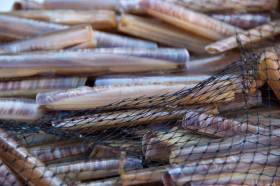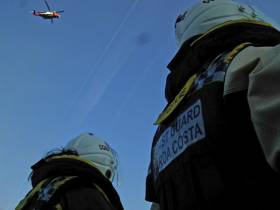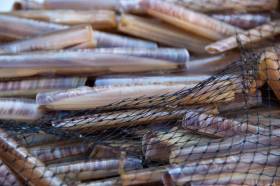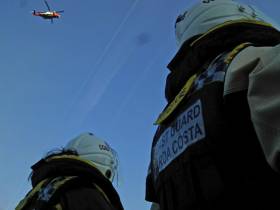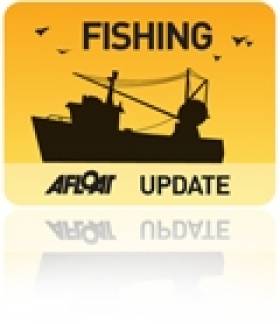Displaying items by tag: Razor Clams
#Fishing - Marine Minister Michael Creed has signed a statutory instrument to increase the minimum conservation reference size for razor clam in the North Irish Sea.
This new measure, which was initiated by local fishermen, comes into effect on 1 July 2018 and means that the minimum landing size for razor clam in the North Irish Sea will be 125mm.
Razor clams are typically fished in the area extending from Howth to Dundalk Bay.
“I welcome the introduction of this measure, particularly as it was proposed and developed by inshore fishermen seeking to protect the sustainability of this important fishery,” Minister Creed said.
“I am pleased the Inshore Fisheries Forums are engaging with conservation issues in the inshore sector, and I would like to thank the forum members for their support in bringing this proposal forward.”
The new conservation measure follows an extensive consultation process involving the National and Regional Inshore Fisheries Forums and a public consultation earlier this year.
It also goes beyond the mandatory standards set by European regulations, and is being touted by the Department of Agriculture, Food and the Marine as another step towards sustainability for the stock.
Industry members see the conservation size increase as a way of protecting smaller razor clams, which may help the razor clam stock to become more sustainable in the long term while also increasing its value.
In 2016, the value of razor clams fished in Irish waters was over €5.7 million. While they do not feature highly on Irish menus, razor clams are in favour in China and Spain.
DPP Directs No Prosecution Over Fatal Razor Clam Boat Capsize
Investigations have concluded and no prosecution will be directed by the DPP over the death of a fisherman off Skerries last summer, as the Irish Examiner reports.
Garda divers recovered the body of Jamie McAllister (28) on 27 May 2017, close to where the razor clam boat he had been working on with his uncle sank the previous day.
The inquest into the incident is now adjourned for full hearing on Thursday 1 November.
Public Consultations Conservation Proposals For Razor Clams In North Irish Sea & Brown Crab
#Fishing - Marine Minister Michael Creed has announced that following proposals made by the National Inshore Fisheries Forum, two public consultations will be held on conservation measures for razor clams in the North Irish Sea and brown crab in Irish waters.
Regarding razor clams, it is proposed to increase the minimum conservation reference size for razor clams in the North Irish Sea.
The change, if implemented would require that only razor clams with a minimum size of 125mm could be landed. Currently any razor clams over 100mm may be landed. This proposal was put forward by the North Irish Sea Razor Fishermen’s Association through the North East Regional Inshore Fisheries Forum.
Regarding brown crab, the proposal is to increase the minimum conservation reference size from 130mm to 140mm for brown crab that may be landed. This proposal was put forward by the members of the fishing industry through the South East Regional Inshore Fisheries Forum.
Interested parties and stakeholders are invited to view and complete the consultations available on the FishingNET website HERE. Submissions may be made via post, e-mail or online through the web portal.
#MCIB - The Marine Casualty Investigation Board (MCIB) will this week begin its inquiry into the sinking of a fishing vessel off Skerries last Friday (26 May) that claimed the life of a local fisherman, according to The Irish Times.
Garda divers recovered the body of 28-year-old Jamie McAllister on Saturday morning, not far from where the fishing trawler went down off the North Dublin coast as previously reported on Afloat.ie.
His crew mate and uncle Keith McAllister was rescued at the scene — and it’s expected that the MCIB will seek an interview this week regarding the circumstances of how their vessel sank while the pair were fishing for razor clams in Force 4 winds.
Earlier this year the five-strong crew of a razor clam vessel fishing in similar conditions were rescued off the nearby Balbriggan coast after their trawler ran aground.
The MCIB previously concluded that dredge fishing for razor clams carries a “high risk” of fouling gear or snagging heavy objects, in its report on the capsize of a fishing boat in Rosslare Harbour in 2015.
#Fishing - Marine Minister Simon Coveney announced on Tuesday (26 May) the introduction of national management measures for razor clams.
The minister brought forward the proposals at the third National Inshore Fisheries Forum (NIFF) meeting, where he announced the introduction of an outtake limit for fishing razor clams in the North Irish Sea of 700kg per vessel per week to take effect from Monday 1 June 2015.
Speaking about the new measures, Minister Coveney said: “At the second NIFF meeting in April, I stated that I would take steps to secure the sustainability of the razor clam fishery, and the new interim measures for the North Irish Sea are a first step in that process.
"I am also conscious that certainty about safe, high quality Irish seafood is important for consumers and for the marketplace. Accordingly, I have decided to introduce national measures to ensure Ireland can demonstrate its commitment to safe seafood.”
The new national measures include:
- Obligations to weigh and report all razor clam landings,
- A requirement to ensure fishing takes place only in shellfish production areas which have been classified for razor clams
- A requirement to fish in only one class of shellfish production area, from a seafood safety perspective, per day, and
- An obligation for vessels in Irish waters to carry GPS tracking equipment from 20 July.
The protection of Natura 2000 sites also featured on the agenda at Tuesday’s meeting, and the minister welcomed support from the NIFF to facilitate stakeholder engagement in preparing mitigation plans for sites with features at risk from certain fishing activities.
“There are features in a number of Natura 2000 sites which are particularly sensitive to certain fishing activities, and we must ensure that the integrity of these Special Areas of Conservation is protected," the minister said.
"Protecting the ecosystems of marine conservation sites preserves the quality of our marine environment and is another step towards harnessing our ocean wealth in a sustainable way.”
The NIFF has been set up to encourage inshore fishing communities to discuss their fishing issues and generate commonly-supported initiatives. Ciaran Quinn of the North West region is the first industry-led chair of the forum, and Eddie Moore of the South West region is the vice chair.
Lobster conservation measures and proposals to manage recreational pot fishing were among the other inshore policy issues discussed by the NIFF members at this week’s meeting.


























